Bolde Surname Ancestry ResultsOur indexes 1000-1999 include entries for the spelling 'bolde'. In the period you have requested, we have the following 46 records (displaying 21 to 30): Single Surname Subscription | | | Buying all 46 results of this search individually would cost £252.00. But you can have free access to all 46 records for a year, to view, to save and print, for £100. Save £152.00. More... |
These sample scans are from the original record. You will get scans of the full pages or articles where the surname you searched for has been found. Your web browser may prevent the sample windows from opening; in this case please change your browser settings to allow pop-up windows from this site. The English in France
(1417-1418)
King Henry V of England claimed the throne of France (and quartered the fleurs-de-lis of France with the lions of England on the royal standard) as had his predecessors since Edward III, as descendants of Philip IV of France. He married Katherine, youngest daughter of king Charles VI of France in 1420, and thereafter styled himself 'heir and regent of France'. The English had real power or influence in Brittany, Normandy, Flanders and Gascony, and actual possession of several coastal garrisons, in particular Calais, where the French inhabitants had been replaced by English. The English administration kept a series of records called the French Rolls. On these are recorded royal appointments and commissions in France; letters of protection and safe-conduct to soldiers, merchants, diplomats and pilgrims travelling to France from England and returning, and to foreign legations. There are also licences to merchants to export to the Continent, and to captains to transport pilgrims. This calendar of the French Roll for the 5th year of the reign of Henry V (21 March 1417 to 20 March 1418) was prepared by Alexander Charles Ewald and published in 1883. BOLDE. Cost: £6.00.  | Sample scan, click to enlarge
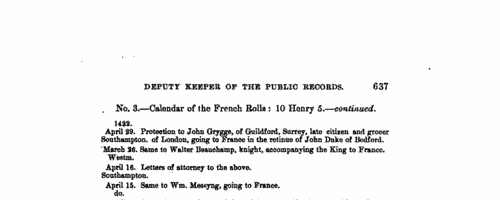
| Freemen of Dublin
(1469)
The franchise rolls of the city of Dublin record the admissions of new freemen, by special grace, having served apprenticeship, or as child or son-in-law of a freeman, each fourth Friday after Easter, Midsummer, Michaelmas and Christmas each year.BOLDE. Cost: £6.00.  | Sample scan, click to enlarge

| Dublin diocese testators and legatees
(1457-1483)
This register of testaments or wills and inventories from the diocese of Dublin in the time of archbishops Tregury and Walton (now in the Library of Trinity College, Dublin) was printed with a translation by the Royal Society of Antiquaries of Ireland in 1896-7. The inventory usually comes first, and often includes names of debtors and creditors to the testator. The diocese of Dublin did not extend far into the Pale; but the province of Dublin, over which the archbishops had prerogative probate jurisdiction, included the southern half of Ireland, but virtually all these wills are from the city of Dublin or close at hand.BOLDE. Cost: £4.00.  | Sample scan, click to enlarge
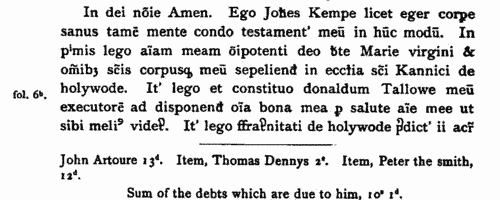
| London and Middlesex Feet of Fines
(1198-1485)
Pedes Finium - law suits, or pretended suits, putting on record the ownership of land in London and Middlesex.BOLDE. Cost: £4.00.  | Sample scan, click to enlarge

| Lichfield Diocese Ordinations: Priests Regular
(1504)
The diocese of Coventry and Lichfield at this period included the whole of Cheshire, Staffordshire and Derbyshire; all Lancashire south of the Ribble; northern Shropshire (including Shrewsbury); and northern Warwickshire (including Birmingham and Coventry). Ordinations took place on the four Ember Saturdays in the year, and on certain other occasions; lists of ordinands to the degrees of acolyte, subdeacon, deacon and priest were preserved in the ordination registers, a distinction being made between those clerks who were 'regular', i. e., monks, friars, &c., and those who were 'secular', the main body of the clergy. All ordinands were celibate, and those regular, and the secular who obtained benefices, remained so, but only a minority of the secular ordinands ever obtained benefices, and most will doubtless have married later in life. No man might be ordained to subdeacon or higher without proving either that he was of independent means or that he was sponsored by an institution or a gentleman. Most entries in the register of such ordinations therefore have the words 'ad titulum' followed by the name of the religious house that was the sponsor. This is an important indication of the man's origins - boys whose families were monastic tenants, and who were educated by the monks, would naturally be sponsored by the abbey. Only men who were born and bred in the diocese could be ordained by the bishop, unless producing letters dimissory from the bishop of the diocese of their birth. These are the ordinations celebrated on Ember Saturday, 1 June 1504 by Thomas bishop of Panados (Pavados), suffragan of bishop Geoffrey Blythe, in Lichfield cathedral.BOLDE. Cost: £8.00.  | Sample scan, click to enlarge

| Lichfield Diocese Ordinations: Acolytes Secular
(1506)
The diocese of Coventry and Lichfield at this period included the whole of Cheshire, Staffordshire and Derbyshire; all Lancashire south of the Ribble; northern Shropshire (including Shrewsbury); and northern Warwickshire (including Birmingham and Coventry). Ordinations took place on the four Ember Saturdays in the year, and on certain other occasions; lists of ordinands to the degrees of acolyte, subdeacon, deacon and priest were preserved in the ordination registers, a distinction being made between those clerks who were 'regular', i. e., monks, friars, &c., and those who were 'secular', the main body of the clergy. All ordinands were celibate, and those regular, and the secular who obtained benefices, remained so, but only a minority of the secular ordinands ever obtained benefices, and most will doubtless have married later in life. No man might be ordained to subdeacon or higher without proving either that he was of independent means or that he was sponsored by an institution or a gentleman. Most entries in the register of such ordinations therefore have the words 'ad titulum' followed by the name of the religious house that was the sponsor. This is an important indication of the man's origins - boys whose families were monastic tenants, and who were educated by the monks, would naturally be sponsored by the abbey. Only men who were born and bred in the diocese could be ordained by the bishop, unless producing letters dimissory from the bishop of the diocese of their birth. These are the ordinations celebrated on Ember Saturday, 19 September 1506, by Thomas bishop of Panados (Pavados), suffragan of bishop Geoffrey Blythe, in Lichfield cathedral.BOLDE. Cost: £8.00.  | Sample scan, click to enlarge
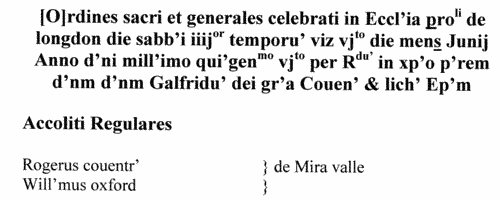
| Lichfield Diocese Ordinations: Priests Secular
(1507)
The diocese of Coventry and Lichfield at this period included the whole of Cheshire, Staffordshire and Derbyshire; all Lancashire south of the Ribble; northern Shropshire (including Shrewsbury); and northern Warwickshire (including Birmingham and Coventry). Ordinations took place on the four Ember Saturdays in the year, and on certain other occasions; lists of ordinands to the degrees of acolyte, subdeacon, deacon and priest were preserved in the ordination registers, a distinction being made between those clerks who were 'regular', i. e., monks, friars, &c., and those who were 'secular', the main body of the clergy. All ordinands were celibate, and those regular, and the secular who obtained benefices, remained so, but only a minority of the secular ordinands ever obtained benefices, and most will doubtless have married later in life. No man might be ordained to subdeacon or higher without proving either that he was of independent means or that he was sponsored by an institution or a gentleman. Most entries in the register of such ordinations therefore have the words 'ad titulum' followed by the name of the religious house that was the sponsor. This is an important indication of the man's origins - boys whose families were monastic tenants, and who were educated by the monks, would naturally be sponsored by the abbey. Only men who were born and bred in the diocese could be ordained by the bishop, unless producing letters dimissory from the bishop of the diocese of their birth. These are the ordinations celebrated on Ember Saturday, 18 September 1507, by Thomas bishop of Panados (Pavados), suffragan of bishop Geoffrey Blythe, in Lichfield cathedral.BOLDE. Cost: £8.00.  | Sample scan, click to enlarge

| Recipients of grants of land by the Crown; and other grantors and grantees
(1427-1516)
Grants of land by the Crown were enrolled on the Charter Rolls: but this series of records was also used by other magnates and religious houses as a way of having their own deeds inspected, confirmed and registered. It will be seen from this that some of the material described in these inspeximuses dates back to a considerably earlier period. In addition, there is an appendix of fragments of charter roll material from 1215 and 1286 to 1288. The royal grants enrolled relate not only to land, but also to various privileges that were part of the royal prerogative.
Most of the material is from England, the remainder relating to Ireland, Wales and possessions in France, but virtually nothing from Scotland, which was an independent kingdom at this period.BOLDE. Cost: £4.00.  | Sample scan, click to enlarge
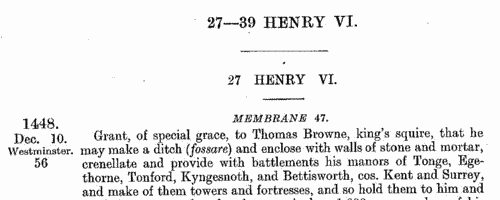
| Liegemen and Traitors, Pirates and Spies
(1554-1556)
The Privy Council of queen Mary was responsible for internal security in England and Wales, and dealt with all manner of special and urgent matters.
BOLDE. Cost: £4.00.  | Sample scan, click to enlarge
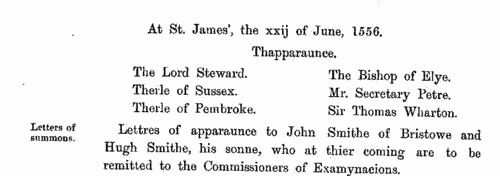
| Inhabitants of Lancashire
(1547-1558)
Pleadings and depositions in the Duchy Court of Lancaster from the 1st year of Edward VI to the 5th and 6th of Philip and Mary were edited by lieutenant-colonel Henry Fishwick for the Lancashire and Cheshire Record Society and published in 1899. The records include some long and detailed depositions about the precise facts of the cases: whereas plaintiffs and defendants were by and large from the landed gentry, deponents were often of much humbler stations in life, people who otherwise hardly appear in surviving records.BOLDE. Cost: £4.00.  | Sample scan, click to enlarge
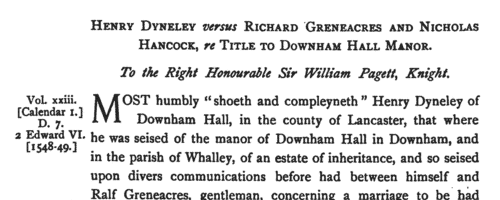
|
Research your ancestry, family history, genealogy and one-name study by direct access to original records and archives indexed by surname.
|












